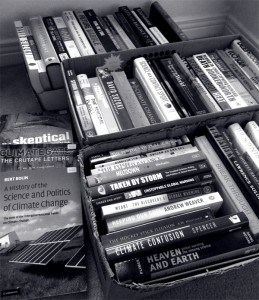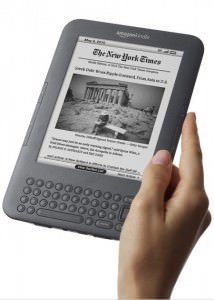A few days ago Amazon.com issued a stunning press release. E-books formatted for the Kindle, Amazon’s wildly popular e-book reader, are now outselling ordinary books.
Last July Kindle e-books achieved a significant milestone. They began outselling hardcovers. By January of this year, they’d overtaken paperbacks “to become the most popular format on Amazon.com.” Now they’re outselling hardcovers and paperbacks combined.
Amazon has apparently sold three times as many e-books in the early months of 2011 as it did during the same period last year.
What does this have to do with the climate debate? It means that anyone writing about these topics is missing out on a significant segment of the market – perhaps the largest segment – if their book isn’t available in the Kindle format.
I suspect traditional publishers spit up their coffee last week when they saw that Amazon press release. Like music labels and movie studios, publishing houses are old world industries that don’t adapt graciously to technological shifts. Rather than embracing new opportunities (I’ve bought far more books in the two months since I’ve owned a Kindle than I normally would have), they seem intent on clinging to their old business model to the bitter end.
I mean, no one can accuse these people of being early adopters. It’s bizarre that none of the Harry Potter books can yet be read on a Kindle. And while the critically acclaimed autobiography of Keith Richards, which was published last October, can be purchased for the Kindle in the UK, it isn’t yet available via Amazon.com – which is where North American readers shop.
At the moment, when I go on a book-writing-retreat, I’m lugging a huge cardboard box full of files, plus three more boxes of books with me. (My husband likes to tease me about this since my clothes usually fit into a single, carry-on-sized suitcase.)

As a writer I look forward to the day when the vast majority of my research material will reside on a Kindle that weighs less than nine ounces – where, by the way, it’s fully searchable both globally as well as by book title. Have I mentioned that every Kindle also has its own e-mail address and that you can e-mail PDFs to it, so that these too also become fully portable and easily accessed?
Kindles are not backlit. This means you can read them comfortably while sunning yourself at the beach – and that you need charge them only about once a month. (The downside is that you’ll require a light source at night, as is the case for a normal book.)
More than 3,000 titles may be stored on a Kindle. Multiple Kindles can be linked to the same Amazon account, which means that when a hot new title is released you, your spouse, and your teenager can all read it at the same time if you happen to be a three device household – for the price of a single copy.
Here are some climate related books currently available for the Kindle:
- An Appeal to Reason, Nigel Lawson Amazon.com $7.96 / Amazon.co.UK £4.22
- The Bad Science and Bad Policy of Obama’s Global Warming Agenda, Roy Spencer Amazon.com $4.69 / Amazon.co.UK £3.34
- The Climate Caper, Garth Paltridge Amazon.com $7.97 / Amazon.co.UK £5.68
- Climategate, Brian Sussman, Amazon.com $7.79 / Amazon.co.UK £8.42
- Climategate: the CRUtape Letters, Mosher & Fuller Amazon.com $11.99 / Amazon.co.UK £8.43
- Climate Confusion, Roy Spencer Amazon.com $9.85 / not available at Amazon.co.UK
- The Climate Fix, Roger Pielke Jr Amazon.com $12.99 / Amazon.co.UK£13.55
- Climate of Extremes, Patrick Michaels Amazon.com $6.62 / Amazon.co.UK £6.03
- Cool It, Bjorn Lomborg Amazon.com $8.50 / not available at Amazon.co.UK
- Confessions of a Greenpeace Dropout, Patrick Moore Amazon.com $9.99 / Amazon.co.UK £8.04
- Heaven and Earth, Ian Plimer Amazon.com $9.99 / Amazon.co.UK£8.40
- Global Warming False Alarm, Ralph Alexander Amazon.com $9.45 / Amazon.co.UK £6.58
- The Great Global Warming Blunder, Roy Spencer Amazon.com $10.99 / Amazon.co.UK £9.06
- Meltdown, Patrick Michaels, Amazon.com $7.79 / Amazon.co.UK £6.79
- The Real Global Warming Disaster, Christopher Booker Amazon.com$9.99 / Amazon.co.UK £7.31
- Red Hot Lies, Christopher Horner, Amazon.com $13.96 / Amazon.co.UK £14.53
- Science as a Contact Sport, Stephen Schneider Amazon.com $15.40 / not available at Amazon.co.UK
- Slaying the Sky Dragon, Tim Ball et al. Amazon.com $7.79 / Amazon.co.UK £3.95
- Smart Solutions to Climate Change, Bjorn Lomborg Amazon.com $14.40 / Amazon.co.UK £13.38
- State of Fear, Michael Crichton Amazon.com $8.99 / Amazon.co.UK £5.49
- The Resilient Earth, Hoffman & Simmons, Amazon.com $9.99 / Amazon.co.UK £6.96
- Unstoppable Global Warming, Singer & Avery, Amazon.com $9.99 / Amazon.co.UK £11.11
As you can see, Kindle prices are all over the map. They also tend to fluctuate. A few weeks ago, when I downloaded Larry Bell’s Climate of Corruption, it was free. Currently, it’s priced at $8.59 at Amazon.com and £7.24 at Amazon.co.UK. (My MBA husband says this price volatility is typical of new markets in which sellers are testing a variety of strategies and attempting to understand the new landscape.)
Of far greater concern is that a number of important books are now at a distinct disadvantage. None of these titles yet have a Kindle edition:
- Air Con, Ian Wishart
- Blue Planet in Green Shackles, Václav Klaus
- Chill, Peter Taylor
- The Chilling Stars, Svensmark & Calder
- Climate: the Counter Consensus, Robert Carter
- Climate: the Great Delusion, Christian Gerondeau
- Climate Coup, Patrick Michaels
- The Climate Files, Fred Pearce
- The Deniers, Lawrence Solomon
- The Discovery of Global Warming, Spencer Weart
- False Alarm: Global Warming – Facts versus Fears, Paul MacRae
- A History of the Science and Politics of Climate Change, Bert Bolin
- The Hockey Stick Illusion, Andrew Montford
- Hot Talk, Cold Science, Fred Singer
- International Environmental Policy: Interests and the Failure of the Kyoto Process, Boehmer-Christiansen & Kellow
- The International Politics of Climate Change, Kellow and Boehmer-Christiansen
- Taken by Storm, Essex & McKitrick
- Why We Disagree About Climate Change, Mike Hulme
- The Wind Farm Scam, John Etherington
I know there’s nothing like a convert, but speaking personally, I think long and hard these days before buying a book printed on paper. Unless I’m giving them as gifts, such purchases have dropped to practically zero. I’m far more likely to buy a second, Kindle copy of a book I already own than I am to buy an old-fashioned book.
Moreover, if I see a Kindle edition that’s priced at $5 or less that sale is a no-brainer. Even if I already own a paper version, the convenience factor is worth it to me. When they’re priced at under $5 books become an impulse buy similar to a fancy beverage at Starbucks or a drink at the pub.
One day, perhaps, publishers might figure this out and we’ll all buy – and read – far more titles than we do now.






